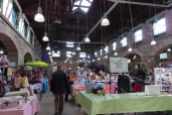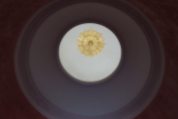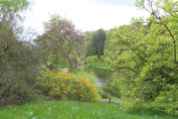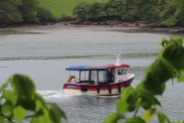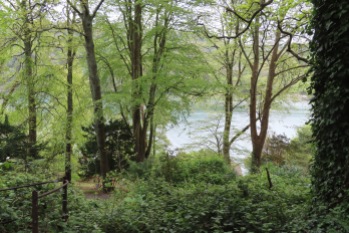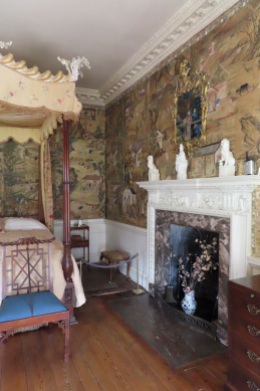My fourth great grandfather Rowland Mainwaring (1782 – 1862) was born 240 years ago on 30 December 1782, two days before the end of the year. He married, at the age of 28, on the last day of 1810.
Some records give Rowland’s date of birth as 31 December 1783. However, his baptism, at St George Hanover Square, recorded on 18 January 1783, gives his date of birth as 30, that is, 30 December 1782. Two pages earlier in the register, the month of December is shown as 1782, with the register dates conforming with the new style of dating adopted in England in 1752, when the start of a new year was changed from Lady Day (25 March) to 1 January.
Rowland Mainwaring joined the Royal Navy at the age of 12 and saw continuous service from 1795 to the end of 1810, when he took leave to marry. This was followed by eight months of half-pay. At the time of his marriage he was a lieutenant with the Narcissus.
His bride was Sophia Duff (c. 1790 – 1824), whom he met at a picnic in Devonport, near Plymouth, on 11 July 1808. They became engaged two years later, in November 1810, and were married on 31 December at Stoke Damerel (now part of Plymouth). In “The First Five Years of My Married Life”, which he published in 1853, Mainwaring described their meeting as love at first sight.


From The First Five Years of My Married Life by Rowland Mainwaring, 1853, pages 21-25:
It was on a cold winter's morning, at the earliest possible hour of December 31st, 1810, that our marriage took place, at the retired village Church of Stoke Damarel, just one short mile distant. It was of the most unassuming and simple description. Bride maids were dispensed with; white favours, to call public attention, those emblems of a man's wisdom or folly, (as the case may be,) which one sees now and then on such occasions, were especially prohibited; in short, we endeavoured to steal away unobserved; and certainly, neither our dresses or retinue bespoke a bridal party. My Wife, attired in a dark riding habit, and close cottage bonnet, ready, if needs must, to travel to the world's end with me, and myself in a non-descript costume, half naval, half civil, with the contents of my wardrobe packed in a kind of sea chest, indicated neither wealth or ostentation. Two post chaises, (wretched vehicles,) which every one who travelled in those days, not possessing the luxury of their own carriage, must remember, formed the interesting cortége, and conveyed us to the church door; one contained the good old Admiral Kelly, with the bride, (who officiated in the absence of her Father; ) the second, myself and the Lady's maid, under the travelling name of “Kitty Rags,” a plain unsophisticated kind of being, wife of a Boatswain's Mate in the Andromache, (or, as she used to call her, the Andrew Mac,) a first class frigate, commanded by my wife's step-father, then at sea. In this vehicle, after the ceremony, were we launched, for better for worse, into the great uncertain matrimonial world. What a change, thought I. The battles, the hurricanes, and heaven knows the host of incidents which all sailors partake of, more or less, in their professional career, sank into insignificance, as I drew a comparison and looked back on my bachelor life on ship board. And thus we rattled along, (in every sense of the word,) from stage to stage. Three days brought us to London, the last of which lay across Bagshot heath. It was late in the evening, and quite dark. I had heard a great deal about robberies, and such like unpleasant incidents on Bagshot, and other heaths in the vicinity of London, and concluding (as a matter of course) that we should be robbed, a consultation was held, how, or in what way we should conceal our valuables ; not that we had many to lose, still what we had were worth preserving, and Kitty Rags undertook to stow away our watches. Where she put them I had not the most distant idea, but she assured us they were perfectly safe, and I thought it unnecessary to make further inquiries. However, good honest Kitty and ourselves were spared the painful operation of a search, and at a late hour we drove up to the Adelphi Hotel, in the Strand, happy in having arrived so far towards our destination without accident or mishap. I had been particularly recommended to this Hotel, as one of a fashionable and first-rate description; and really, if enormous charges constitute fashion, we had arrived at the right place; but the locality did not appear to me very first-rate, and in a few days we cut and run to more suitable lodgings, that is to say, better suited to the confined state of our finances. Never was poor amphibious creature more out of his element than myself ; scarcely had I passed a month ashore than my heart yearned for the sea, and although I was as happy as mortal could wish, I longed to be again pacing the quarter deck. Such is the perverseness of human nature. I soon became tired of the great Metropolis, had seen all there was to be seen, whereupon we weighed anchor, left our lodgings, and started for the country. We had many invitations, and many kinsfolk to whom I wished to introduce my wife, and between whom we passed the first six months of my married life. It was at one of these hospitable houses that I underwent the process of Christianizing, (if I may so express myself,) for I was told that really I was but an elder species of unlicked cub, quite unacquainted with men and manners, scarcely advanced beyond a cockpit education, and that, occasionally, I made use of expressions very offensive to ears polite, and, therefore, it was actually necessary I should be taken in hand, polished up and reformed. I had an entire new outfit from a first-rate Northampton tailor; my old sea chest was exchanged for a handsome travelling trunk, and the odour of pitch and tar, with which my clothes were dreadfully impregnated, in process of time, by the friendly aid of soap and soda, completely purified.
Mainwaring and Sophia travelled to London for their honeymoon. The coach took three days; they were a little concerned about being robbed on the way.
Their first London hotel was the Adelphi, but though, Mainwaring said, it had been recommended to them as one of a “fashionable and first-rate description; and really, if enormous charges constitute fashion, we had arrived at the right place…the locality did not appear to me very first-rate, and in a few days we cut and run to a more suitable lodgings, that is to say, better suited to the confined state of our finances.”
[The Adelphi Hotel was located at 1-4 John Street in the Adelphi Buildings designed the Adams brothers in the 1780s. The buildings were demolished in the 1930s.]

Soon afterwards, tired of London and having “seen all there was to be seen” they left to visit family and friends in the country. They then settled at Stoke, the village they had married in, near Devonport.
After 8 months on half-pay Rowland returned to sea; on 16 August 1811 he was appointed as senior Lieutenant to the Menelaus, a 38-gun fifth rate frigate.
Rowland and Sophia had eight children. She died aged 33 on 11 October 1824 in Bath, two months after the birth of her eighth child.


Related posts and reading:
- Midshipman Rowland Mainwaring
- Rowland Mainwaring: from midshipman to rear-admiral
- Sophia Duff
- Mainwaring, Rowland. The First Five Years of My Married Life. 1853. Retrieved through Google Books.
Wikitree:











